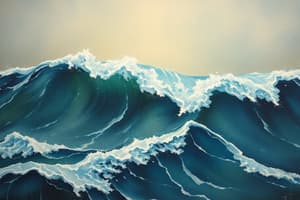Podcast
Questions and Answers
Label the parts of the transverse wave:
Label the parts of the transverse wave:
Amplitude = B Crest = A Trough = C Wavelength = D
Label the parts of the longitudinal wave:
Label the parts of the longitudinal wave:
Compressions = A Rarefactions = B Wavelength = C
Which statement correctly describes the relationship between the energy of a wave and the wave's amplitude?
Which statement correctly describes the relationship between the energy of a wave and the wave's amplitude?
- High energy waves have high amplitudes. (correct)
- Low energy waves have high amplitudes.
- High and low energy waves have the same amplitudes.
Which electromagnetic wave has the shortest wavelength?
Which electromagnetic wave has the shortest wavelength?
Which electromagnetic wave would have a wavelength approximately the size of the tip of a pencil?
Which electromagnetic wave would have a wavelength approximately the size of the tip of a pencil?
Which electromagnetic wave has the longest wavelength?
Which electromagnetic wave has the longest wavelength?
Which statement correctly describes the relationship between frequency and wavelength?
Which statement correctly describes the relationship between frequency and wavelength?
What is the speed of a wave that has a frequency of 125 Hz and a wavelength of 1.25 meters?
What is the speed of a wave that has a frequency of 125 Hz and a wavelength of 1.25 meters?
Complete the passage to summarize factors affecting the speed of a wave. The material or substance that a wave moves through is called a _____. The medium affects the speed of the wave that passes through it. One factor that affects the speed of a wave is the ____ of medium. Some waves move faster in solids and some waves move faster in liquids and gases. Another factor that affects wave speed is the ____ of the medium.
Complete the passage to summarize factors affecting the speed of a wave. The material or substance that a wave moves through is called a _____. The medium affects the speed of the wave that passes through it. One factor that affects the speed of a wave is the ____ of medium. Some waves move faster in solids and some waves move faster in liquids and gases. Another factor that affects wave speed is the ____ of the medium.
Match the following terms with their definitions:
Match the following terms with their definitions:
What are the properties of transverse and longitudinal waves?
What are the properties of transverse and longitudinal waves?
Which wave, A or B, has lower energy?
Which wave, A or B, has lower energy?
How high should the engineer build the wall?
How high should the engineer build the wall?
Order the waves from shortest wavelength (1) to longest wavelength (4): Gamma rays, Microwaves, Radio, Visible light.
Order the waves from shortest wavelength (1) to longest wavelength (4): Gamma rays, Microwaves, Radio, Visible light.
What order shows increasing frequency for gamma rays, microwaves, visible light, and X-rays?
What order shows increasing frequency for gamma rays, microwaves, visible light, and X-rays?
What is the wavelength of a wave that has a speed of 350 meters/second and a frequency of 140 hertz?
What is the wavelength of a wave that has a speed of 350 meters/second and a frequency of 140 hertz?
Identify the missing term: A ____ is any disturbance that carries energy from one place to another through matter and space.
Identify the missing term: A ____ is any disturbance that carries energy from one place to another through matter and space.
Complete the statement: The more energy a wave carries, the ____ its amplitude.
Complete the statement: The more energy a wave carries, the ____ its amplitude.
Which statement best describes the energy in Henri and Geri's waves?
Which statement best describes the energy in Henri and Geri's waves?
Flashcards are hidden until you start studying
Study Notes
Properties of Waves
- A transverse wave consists of parts like amplitude (height), crest (top), trough (bottom), and wavelength (distance between crests).
- Longitudinal waves are characterized by compressions (areas of high pressure), rarefactions (areas of low pressure), and wavelength (distance between repeating points).
Energy and Amplitude
- High energy waves are associated with higher amplitudes, indicating a direct relationship between energy and amplitude.
Electromagnetic Waves
- Gamma rays possess the shortest wavelength among electromagnetic waves.
- Infrared waves have wavelengths approximately the size of a pencil tip.
- Radio waves have the longest wavelength in the electromagnetic spectrum.
Frequency and Wavelength
- Increasing frequency of a wave results in a shorter wavelength, demonstrating the inverse relationship between frequency and wavelength.
Wave Speed Calculation
- The speed of a wave can be calculated using frequency and wavelength; for a wave with a frequency of 125 Hz and wavelength of 1.25 meters, the speed is approximately 156 meters per second.
Factors Affecting Wave Speed
- The medium through which a wave travels significantly impacts its speed.
- Different materials affect wave speed differently: some waves travel faster in solids, while others are quicker in liquids or gases.
- Factors influencing wave speed include the type of medium and its temperature.
Key Wave Properties
- Period is the time required for one wavelength to pass a given point.
- Wavelength measures the distance between consecutive crests or troughs.
- Amplitude reflects the height of a wave from the midpoint to a crest or trough.
- Frequency counts the number of wavelengths crossing a point per second.
- Speed denotes the distance a wave travels in a unit of time.
Comparing Waves
- Both transverse and longitudinal waves display amplitude as a shared property.
- Compression refers exclusively to longitudinal waves.
- Frequency, period, and wavelengths can relate to both types of waves.
Energy Comparison
- Lower energy waves exhibit lower amplitudes, meaning A would have lower energy compared to B if A has a lower amplitude.
Structural Engineering
- To design a protective wall for coastal cities, an engineer should consider wall height; a recommendation of 200 meters is noted.
Ordering Wavelengths
- When ordering from shortest to longest wavelength:
- Gamma rays (shortest)
- Microwaves
- Visible light
- Radio waves (longest)
Frequency Hierarchy
- The increasing frequency order for specific waves is microwaves, visible light, X-rays, and gamma rays.
Wavelength Calculations
- For a wave with a speed of 350 meters/second and a frequency of 140 Hz, its wavelength is calculated as 2.5 meters.
Definition of a Wave
- A wave is defined as any disturbance that transfers energy across matter and space.
Energy and Amplitude Relationship
- Higher amplitude correlates to the greater energy carried by a wave.
Comparing Amplitudes
- Henri's wave, with a 4 cm distance from midpoint to trough, and Geri's wave, with an 8 cm height between crest and trough, have the same amplitude and energy level.
Studying That Suits You
Use AI to generate personalized quizzes and flashcards to suit your learning preferences.




